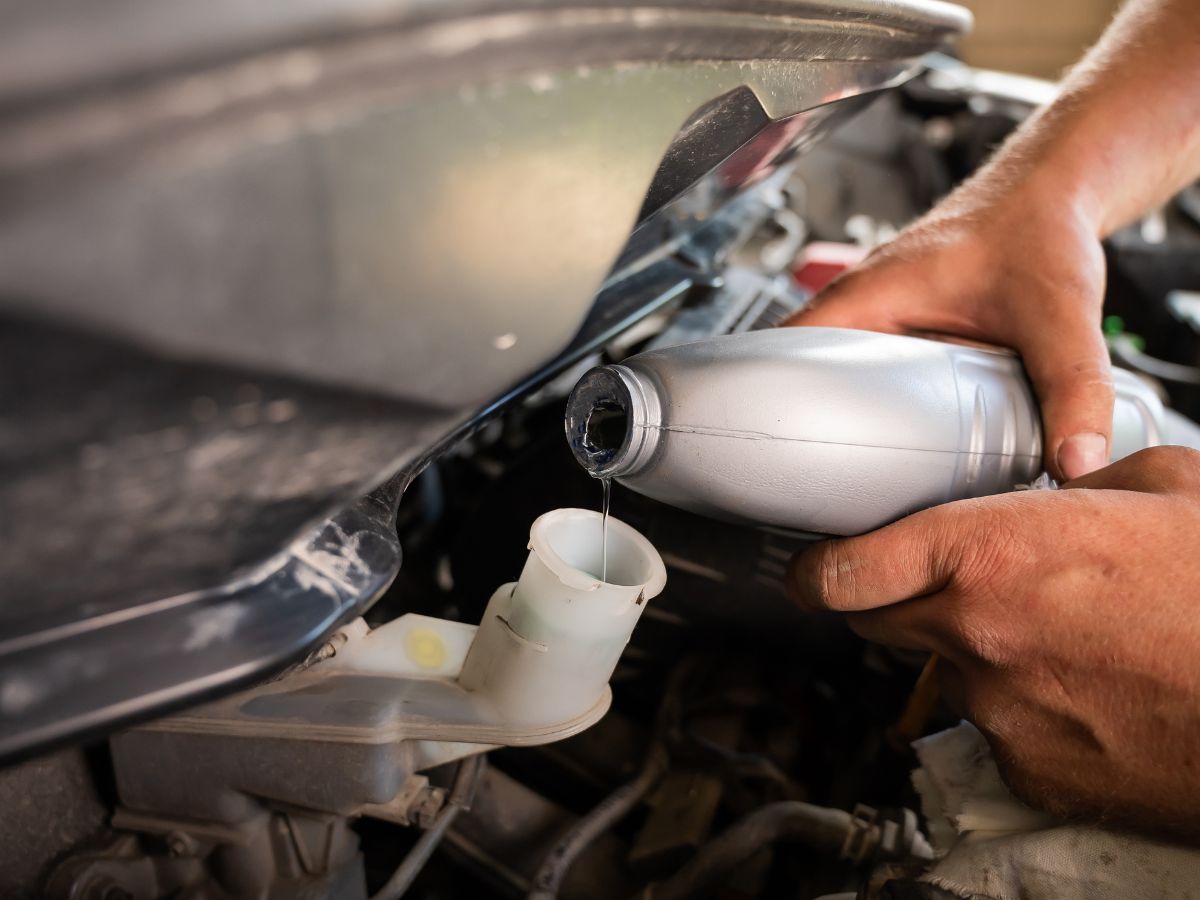In This Article Show
With over a decade of hands-on experience in the world of mechanics, I’ve had the privilege of using my knowledge to keep countless vehicles and machinery in optimal condition. But it’s not all about turning wrenches and replacing parts. There’s a lot more to it, including understanding the crucial role of certain fluids like hydraulic jack oil.
Hydraulic jacks are handy tools. From helping you change a flat tire to facilitating major construction projects, they do the heavy lifting that human strength alone cannot achieve.
The force behind their power? Hydraulic oil. This incredible fluid allows the jack to lift heavy loads smoothly and consistently. But what happens when your hydraulic jack oil runs out or needs to be replaced? Enter hydraulic jack oil substitutes.
This blog post is a comprehensive guide that will educate you about these substitutes, providing you with a complete list, and helping you understand which one is the best for your particular needs.
Understanding Hydraulic Jack Oil
To fully appreciate the substitutes we’ll be discussing, it’s crucial first to understand what hydraulic jack oil is and why it’s so important.
Hydraulic jack oil is a high-quality oil with specific properties that make it suitable for hydraulic systems. These systems, such as those found in hydraulic jacks, rely on the transmission of power through fluid pressure – in this case, hydraulic oil.
One of the critical features of hydraulic jack oil is its viscosity. Viscosity refers to the oil’s resistance to flow or, simply put, its ‘thickness.’ High viscosity means the oil is thicker and flows slower, while lower viscosity means the oil is thinner and flows faster.
For hydraulic jacks, you need oil with just the right viscosity – not too thick that it won’t flow properly, but not too thin that it can’t sustain the pressure required.
Hydraulic jack oil also offers excellent lubrication to prevent metal-on-metal contact within the hydraulic system, reducing wear and tear on the jack’s components. This lubrication property helps extend the life of your hydraulic jack and maintain its optimal performance.
Moreover, this oil has certain anti-wear additives and rust inhibitors, which play an important role in maintaining the health of your hydraulic jack system. These additives minimize the wear and tear of components and prevent rust and corrosion, further enhancing the jack’s longevity.
To sum up, the main functions of hydraulic jack oil are to transmit power, lubricate the system, prevent wear and tear, and inhibit rust. Now that we understand the role of hydraulic jack oil let’s move on to the signs that might indicate you need a substitute.

What to Consider When Looking for a Substitute
Now that you understand hydraulic jack oil’s essential role, it’s easier to grasp the characteristics a good substitute should possess. Here are the key points to keep in mind when selecting a substitute for hydraulic jack oil:
1. Viscosity
As we mentioned earlier, viscosity is crucial to how hydraulic oil (or its substitute) functions. An ideal substitute should possess a similar viscosity to the recommended hydraulic oil. It should be neither too thin (as it may not withstand the pressure) nor too thick (which might restrict its flow).
2. Lubrication Properties
A substitute should have excellent lubrication qualities to reduce friction among the hydraulic jack components. This attribute will protect the system from premature wear and tear.
3. Compatibility with Seals
Not every oil is safe for the seals in your hydraulic jack. Some types of oil can cause the seals to swell or shrink, which can lead to leaks or even failure of the hydraulic jack. Always check that the substitute is compatible with the types of seals used in your specific hydraulic jack.
5. Anti-Wear and Anti-Corrosion Additives
Look for a substitute that contains anti-wear and anti-corrosion additives. These additives extend the lifespan of the hydraulic system and maintain its efficiency.
6. Operating Temperature Range
Different oils perform optimally at different temperatures. Some may become too thin when heated or too thick when cooled. A good hydraulic jack oil substitute should have a stable viscosity over a wide temperature range, matching the operating environment of your hydraulic jack.
7. Availability and Cost
Finally, consider the availability and cost of the potential substitute. The substitute should be readily available and cost-effective, but remember, the quality should not be compromised for the sake of cost.
Using a substitute is often a temporary measure or a decision made out of necessity. It’s recommended to use the manufacturer’s recommended hydraulic oil for the best performance and longevity of your hydraulic jack.
Complete List of Hydraulic Jack Oil Substitutes
Now that we understand what to look for in a hydraulic jack oil substitute, let’s explore some options. Here are several alternatives that can be used:
1. Automatic Transmission Fluid (ATF
ATF is a commonly used substitute for hydraulic oil. It has good viscosity and excellent lubrication properties. However, it contains detergents that can potentially damage the seals in your jack over time. Use it sparingly and only as a temporary solution.
How it compares to Hydraulic jack oil
ATF is readily available and relatively inexpensive. It performs well in most hydraulic jacks due to its suitable viscosity and excellent lubrication properties. However, its detergent content can potentially harm the seals, making it less suitable for long-term use.
2. Motor Oil
In a pinch, motor oil can be used as a hydraulic oil substitute. It possesses good viscosity and lubrication qualities. However, it lacks the additives found in hydraulic oil, which can limit its effectiveness.
How it compares to Hydraulic jack oil
Motor oil is another common and affordable option. It’s widely available and offers suitable viscosity for many jacks. While it provides good lubrication, it lacks some of the additives present in hydraulic oil, which might affect the longevity and performance of your jack over time.
3. Brake Fluid
While it’s not ideal, brake fluid can be used as a hydraulic jack oil substitute in emergency situations. It has a high-temperature tolerance and good viscosity. But it can be corrosive to certain materials and seals, so only use it if you have no other option.
How it compares to Hydraulic jack oil
Brake fluid has high temperature tolerance and good viscosity but can be corrosive to certain materials and seals. It is generally not recommended unless necessary due to these potential issues.
4. Power Steering Fluid
Power steering fluid is another alternative to hydraulic oil. It’s designed to work under pressure and resist heat, making it a viable option. However, it can be more expensive than other substitutes.
How it compares to Hydraulic jack oil
This fluid is designed to work under high pressure and resist heat, which makes it a viable substitute. However, it tends to be more expensive than other alternatives, and its availability might not be as widespread.
5. Air Tool Oil
This oil is thin, which makes it suitable for a hydraulic system. It has great anti-wear properties and is safe for seals, but its thin viscosity may not be suitable for all types of hydraulic jacks.
How it compares to Hydraulic jack oil
Its thin viscosity makes it suitable for some hydraulic systems. It’s generally safe for seals and has excellent anti-wear properties. However, because it’s thinner than most hydraulic oils, it might not be the best choice for heavy-duty hydraulic jacks.
6. Diesel Engine Oil
Diesel engine oil has high viscosity and good lubrication properties, making it a suitable substitute. However, it can be too thick for some systems and may affect their performance.
How it compares to Hydraulic jack oil
Diesel engine oil is a high-viscosity oil that can perform well in specific hydraulic jacks. However, its thickness might make it less suitable for systems requiring thinner oil. It’s widely available and generally affordable.
Each of these substitutes has their pros and cons. When choosing one, please consider the factors we discussed in the previous section. Remember, these are substitutes and may not offer the same performance or lifespan as dedicated hydraulic jack oil. If you’re unsure, consult your jack’s manufacturer guide or a professional.
Frequently Asked Questions
With so much information about hydraulic jack oil substitutes, it’s normal to have questions. Here, we address some of the most frequently asked questions on the subject.
Can I use cooking oil as a hydraulic jack oil substitute?
No, cooking oil is not suitable for use in a hydraulic jack. It doesn’t possess the necessary viscosity, lubrication properties, and heat resistance needed for a hydraulic system. Plus, it can degrade quickly and become sticky, potentially causing damage to your hydraulic jack.
What happens if I use the wrong oil in my hydraulic jack?
Using the wrong oil can lead to a range of problems. It can result in poor performance, increased wear and tear, seals damage, and even hydraulic system failure. Using the manufacturer’s recommended oil or a suitable substitute is always best.
How often should I change the oil in my hydraulic jack?
While it depends on usage and the manufacturer’s recommendations, a general rule is to change the oil in your hydraulic jack once every year or after every 100 hours of operation. Regularly checking the oil level and its condition can also help you determine when it’s time for a change.
What is the lifespan of a substitute compared to regular hydraulic oil?
The lifespan of a substitute can vary based on its quality and the operating conditions of the hydraulic jack. However, substitutes generally may not last as long as a high-quality hydraulic jack oil designed for the job. Regular inspection and maintenance are key to ensuring the longevity of your hydraulic system, regardless of the oil type you’re using.
Can I mix different types of oil in my hydraulic jack?
Mixing different types of oil is generally not recommended. Different oils have different properties and additives, and mixing them can lead to unpredictable results. It’s best to completely drain the old oil before adding the new one, whether it’s a substitute or regular hydraulic oil.
Wrapping it up
In conclusion, each substitute has its strengths and weaknesses, and their suitability depends on the specific requirements of your hydraulic jack, its intended usage, and your specific circumstances.
When in doubt, it’s always best to consult with a professional or your jack’s manufacturer. And remember, these are substitutes – ideally, it’s always best to use the manufacturer’s recommended hydraulic oil.


















